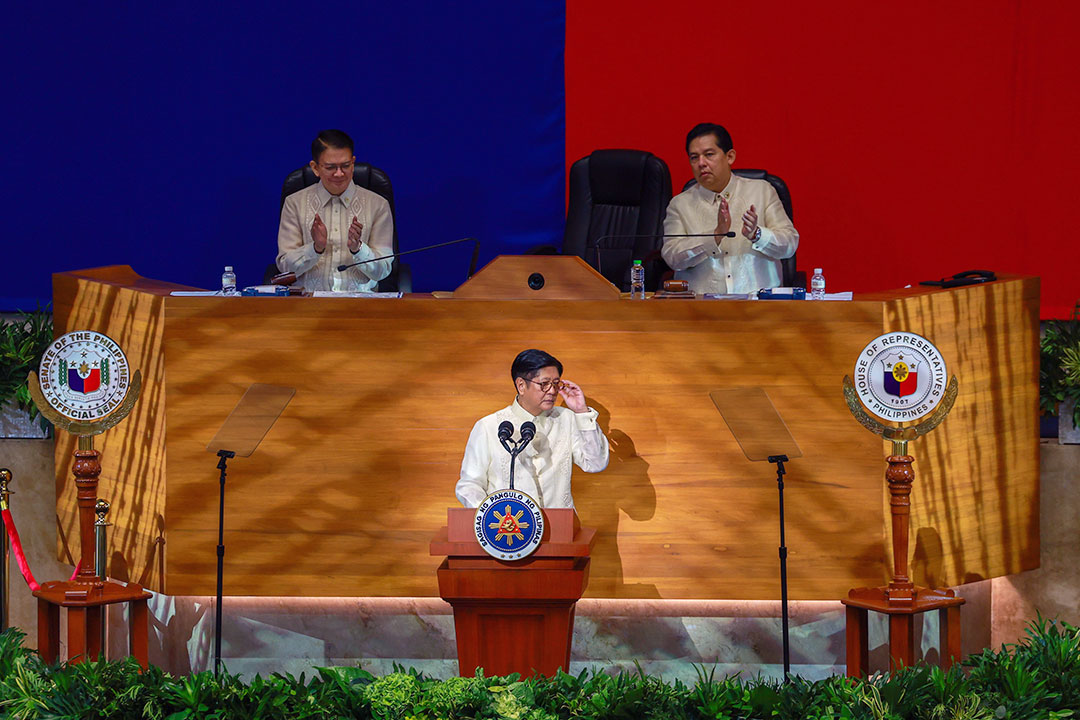
Thinking Beyond Politics
By Victor Andres C. Manhit

Once a year, a sitting president addresses the people to report these three things: initiatives begun in the past, results being reaped in the present, and a roadmap that would guide future actions. This is what exactly transpired during President Ferdinand Marcos, Jr.’s State of the Nation Address (SONA) on Monday.
He went into it knowing full well what the people were expecting — demanding — to hear. A Pulse Asia survey from late June revealed that 61% of Filipinos considered controlling inflation as their top concern, followed by increasing wages (51%), and expanding employment opportunities (25%). It was clear that despite the political noise, economic issues, specifically those pertinent to their everyday lives, were the most important ones to be addressed. We wanted the President to relate his administration’s efforts to attract foreign and local investments, streamline business processes, and develop infrastructure according to the people’s need for more and better-quality jobs that would enable them to improve their lives.
The people have also acknowledged the administration’s efforts to lower rice prices and support farmers. In fact, in the June survey, 33% of Filipinos believe that the administration has been successful in addressing the problem of involuntary hunger. This was a seven-percentage-point jump from June 2024.
And so President Marcos Jr. began with a humble acknowledgment of the need to do better, and the need to cascade nominal economic gains to the lived experiences of Filipinos. “People are frustrated and disappointed with the government, especially in terms of basic services. The lesson for us is simple: we need to do better — and we need to move faster. If we only look at the data, the economy looks good. Business confidence has increased, inflation has gone down, and jobs have grown. But all of that is just decoration. It means nothing if our fellow Filipinos continue to struggle and feel burdened in their daily lives.”
Just as expected, economic issues were the first tackled in his speech. The President assured the people that as they were looking for good jobs, the administration is also finding ways and opportunities to make this happen. He made a shoutout to foreign investors — “The Philippines is ready. Invest in the Philippines,” he said. He talked about being able to manage the prices of goods by addressing issues facing the items in the consumer basket that are driving prices upwards — specifically, food and energy.
And yet, while economics is an important concern for Filipinos, so is transparency and accountability in the pursuit of an honest government that works only for the people. A significant 24% of our people still consider graft and corruption in government as a key concern.
To be sure, approval ratings for the administration’s performance in combating corruption have improved to 28% in June 2025 from 24% in June 2024. People must be seeing something being done right. And yet, there remains a lot to do.
The President invoked Filipinos’ fresh experience of flooding after the string of typhoons — the “new normal,” he previously said. But during the SONA he made sure that this was accompanied by a challenge to do away with corrupt practices that took much away from the people they were supposed to serve.
“Mahiya naman kayo (You should be ashamed),” he uttered numerous times, and emphatically. “To those conspiring to siphon public funds and steal the future of our people: have some shame. Have shame for your fellow Filipinos whose homes were washed away or submerged in floods. Have shame especially for our children, who will inherit the debts you created when you pocketed that money,” he said in Filipino as he warned that all flood control projects will be evaluated and that anomalies will be investigated.
Further, President Marcos Jr. warned that he would rather have a reenacted budget for 2026 than have items that are not aligned with the National Expenditure Plan.
This year’s SONA was given mostly in Filipino and touched on the details of the people’s everyday lives — education, health, transportation. The effort to reach out and be more accessible to the common citizen is apparent. We hope that in these next three years, these will not be just in form. Ultimately, the test of the power of the speech is in the operationalization of mechanisms that would help attain targets and objectives in the remaining years of his term, and beyond.
At the very least, the SONA assured the people that the President is listening and is not just aware but mindful of whether his actions and decisions align with what the people want and need. As he moves toward the remaining years of his administration, the President must also bear in mind that the legacy he will leave will depend on how he hewed close to the utterances and promises he made to the people during these annual addresses. He will be judged by history depending on whether he used his own words to guide his actions, or just to gain popular support during a trying juncture in the life of our nation.
Victor Andres “Dindo” C. Manhit is the president of the Stratbase ADR Institute.